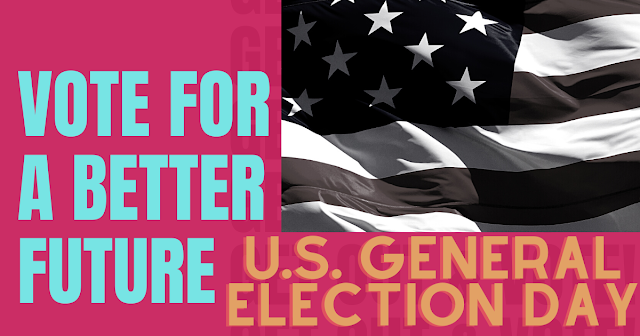Election Day is the yearly day designated by law in the United States for the general elections of federal public officers. According to federal law, it must occur "the Tuesday next after the first Monday in the month of November," which corresponds to the Tuesday between November 2 and November 8.
Election Day only takes place in even-numbered years for the president, vice president, and members of the US Congress, as well as for the majority of governorships (all save Kentucky, Louisiana, Mississippi, New Jersey, and Virginia). Every four years, in years that are divisible by four, there are presidential elections, in which the electors for the president and vice president are chosen based on the criteria established by each state. Every two years, elections are held for both the US House of Representatives and the US Senate. While representatives serve two-year terms and are up for reelection every two years, senators have six-year terms that are staggered so that one-third of them are elected in each general election. Midterm elections are general elections in which presidential candidates are not on the ballot. The president and vice president are inaugurated (sworn in) on Inauguration Day, which is typically January 20. Terms for those elected begin in January of the following year.
In order to save money and time, a lot of state and local government positions are also elected on Election Day. However, a few states hold elections for state positions (like a governor) during odd-numbered off years, or during other even-numbered midterm years, and may hold special elections for positions that have become vacant. The presidential (3 U.S.C. 1) and congressional (2 U.S.C. 1 and 2 U.S.C. 7) elections must take place on the same day, despite the fact that early voting is permitted in many states and mail-in balloting is also available in several.
Election Day falling on a Tuesday has drawn criticism in recent years since many people might not be able to cast a ballot due to their employment. Several states, including Delaware, Hawaii, Illinois, Kentucky, Louisiana, Montana, New Jersey, New York, Virginia, West Virginia, and the territories of Puerto Rico and the Northern Mariana Islands, observe it as a public holiday. Other states mandate that employees be allowed to take paid time off. Employees in California are required to receive two hours of paid time off at the start or conclusion of a shift if they are otherwise unable to cast a ballot. Some have suggested making Election Day a government holiday named Democracy Day, while others have suggested relocating Election Day to the weekend. Other campaigns in the IT and auto sectors compel firms to offer paid time off to their staff on election day.
History of Election Day (United States)
Federal law allowed state legislatures to select presidential electors at any moment during the 34 days leading up to the first Wednesday in December by 1792. Elections in November were convenient since the harvest would be over but the worst winter weather, which would impede travel, would not yet have come. The election results would also roughly coincide with the start of a new year. Election day was set for Tuesday so that people could go to church on Sunday, go to the polls on Monday (which were typically in the county seat), and cast their ballots before Wednesday, which was typically when farmers would sell their produce at the market. Initially, the process used by governments to select electors varied greatly. States gradually shifted toward some sort of popular vote.
The creation of the Morse electric telegraph, which Congress supported in 1843 and successfully tested in 1844, was a technological accomplishment that unmistakably heralded the impending national adoption of instant communication. Congress responded in 1845 by requiring a standard national date for selecting Presidential electors in order to prevent information from one state from influencing election outcomes in another. As the time between Election Day and the first Wednesday in December is always 29 days, Congress picked the first Tuesday following the first Monday in November to align current electoral practice with the existing 34-day frame under federal law. Election Day will henceforth only be held during the week of November 2–8, inclusive. States eventually brought the majority of elections into compliance with this date beginning with the presidential election.
The beginning and end dates for the terms of the President, Vice President, Members of Congress, and Senators were altered by the Twentieth Amendment, which was ratified in 1933. Election Day's timetable was unaffected.
Election Day (United States) Criticism
Tuesdays are required work days for the majority of the electorate. This has prompted activists to advocate for alternate strategies to boost voter turnout. Other options include making Election Day a federal holiday or combining it with Veterans Day, which is observed on November 11 every year. Additional options include allowing voting to take place over several days, requiring paid time off for voting, encouraging early voting or voting by mail, and encouraging states to support flexible voting.
Election Day on Weekends
Due to the fact that Louisiana's statewide elections are held on odd years and the state's unique primary system, a variation of the nonpartisan blanket primary, only requires a runoff to be held on federal election day (Tuesday) for those offices for which neither of the top two candidates receives an absolute majority of the vote, Louisiana is currently the only state in the United States to hold de facto general elections on a Saturday.
Conclusion
There you have it. As you can see, the first presidential election was held in 1789, but states hadn't yet been allotted their electoral votes at the time. The first state to do that was Massachusetts in 1796, which led to a tie between George Washington and John Adams. The House of Representatives then decided who should become President by flipping a coin.
More: Cyber Monday, Coffe Day, Sears Creadit card, Diagram of the heart


Post a Comment